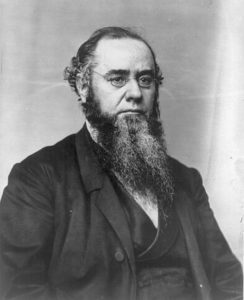
Edwin M. Stanton
*Edwin McMasters Stanton was born on this date in 1814. He was a white-American lawyer and politician.
The first of David and Lucy Stanton's four children, Edwin McMasters, was born to them in Steubenville, Ohio. Edwin's early formal education consisted of a private school and a seminary behind Stanton's residence called "Old Academy." He was transferred to a school taught by a Presbyterian minister when he was ten. It was also at ten that Edwin experienced his first asthma attack, an illness that would haunt him for life, sometimes to the point of convulsion. His asthma assured him he could not partake in highly physical activities, so he found interest in books and poetry.
He attended Methodist church services and Sunday school regularly. At thirteen, Stanton became a full member of the Methodist church. His father’s medical practice afforded his family a decent living. Edwin and his family were left destitute when David Stanton suddenly died in December 1827 at his residence. Edwin's mother opened a store in the front room of their residence, selling the medical supplies her husband left her, along with books, stationery, and groceries. Edwin was removed from school and worked at a local bookseller's store. Stanton began his college studies at the Episcopal Church-affiliated Kenyon College in 1831.
At Kenyon, Stanton was involved in the college's Philomathesian Literary Society. He sat on several of the society's committees and often participated in its exercises and debates. However, he was forced to leave Kenyon just at the end of his third semester due to a lack of finances. At Kenyon, his support of President Andrew Jackson's actions during the 1832 Nullification Crisis led him into the Democratic Party. Further, Stanton's conversion to the Episcopal Church and his revulsion of the practice of slavery were solidified there.
After Kenyon, Stanton worked as a bookseller in Columbus. Stanton had hoped to obtain enough money to complete his final year at Kenyon. However, a small salary at the bookstore dashed the notion. He soon returned to Steubenville to pursue studies in law. He served as Secretary of War under the Lincoln Administration during most of the American Civil War. Stanton's management helped organize the massive military resources of the North and guided the Union to victory. However, he was criticized by many Union generals, who perceived him as overcautious and micromanaging. Amid General Sherman's "March to the Sea" during the War, Sherman and Stanton met with 20 Black community leaders in Savannah, Georgia. He organized the search for Abraham Lincoln's assassin, John Wilkes Booth.
After Lincoln's assassination, Stanton remained the Secretary of War under the new US president, Andrew Johnson, during the first years of Reconstruction. He opposed Johnson's lenient policies toward the former Confederate States. Johnson's attempt to dismiss Stanton ultimately led to Johnson being impeached by the Radical Republicans in the House of Representatives. Stanton returned to law after he retired as Secretary of War. In 1869, he was nominated as an Associate Justice of the Supreme Court by Johnson's successor, Ulysses S. Grant. Stanton died four days after the Senate confirmed his nomination on December 24, 1869.